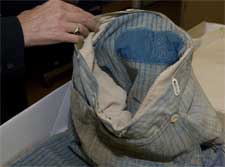 Susan Jerome heading to Hawaii as one of five candidates for national award
Susan Jerome heading to Hawaii as one of five candidates for national award
KINGSTON, R.I. – September 22, 2008 – With 28 patches sewn into the pair of pants, the intrinsic value placed on fabric by people in the 1820s is apparent. In a departure from today’s wasteful society, materials were preserved and used as long as possible by people of the 19th century.
The pants are one of Susan Jerome’s favorite pieces that she came across during research on trade cloth on American whaleships in the 19th century. Jerome is the collections manager of the Historic Textile and Costume Collection at the University of Rhode Island. She researched the trade cloth for her thesis while earning a master’s degree from the Department of Textiles, Fashion Merchandizing and Design.
 Jerome’s research caught the eye of the Textile Society of America, which has tabbed her as one of five national finalists out of nearly 100 nominations for the group’s Founding Presidents Award. Established to recognize excellence in the fields of textile studies, the award will be presented in Honolulu, Hawaii at the 11th biennial symposium of the Textile Society of America, to be held Sept. 24 through Sept. 27. Jerome will attend the symposium, where she also will present her research.
Jerome’s research caught the eye of the Textile Society of America, which has tabbed her as one of five national finalists out of nearly 100 nominations for the group’s Founding Presidents Award. Established to recognize excellence in the fields of textile studies, the award will be presented in Honolulu, Hawaii at the 11th biennial symposium of the Textile Society of America, to be held Sept. 24 through Sept. 27. Jerome will attend the symposium, where she also will present her research.
“An award-winning paper must present excellent, original research that makes a significant contribution to the fields of textile studies,” said Pamela Parmal, chair of the Textile Society of America Presidents Award Committee. “The work must be clearly presented in a well-organized and well-written paper that provides a broad enough context for non-specialists to understand its significance and that gives credit, where appropriate, to previous scholarship or artistic endeavor.”
During her presentation, which focuses on the 50-year period from 1820 to 1870, Jerome will show the use of cloth as a bartering commodity within the ship, as well as at the various stops made during trips at sea. With the Industrial Revolution thriving in the Northeast, whaling ships out of New Bedford, Nantucket and New London could stock up on fabrics and light materials before trips to the Pacific Ocean.
Whalers often used fabric for bartering with indigenous peoples who did not produce printed cloth themselves. In exchange for the fabrics, whalers would get products such as chickens, bananas and sugar cane from the natives where they stopped.
“While they were on the whaling trips, they went to areas of the world where money and gold was not worth anything,” Jerome said. “Cloth was used for bartering, to get supplies needed for the trips, such as water, food and even souvenirs. For the whalers, fabric was their money.”
Jerome did most of her research at the New Bedford Whaling Museum, the Nantucket Historical Association and Mystic Seaport, where she worked for 13 years before coming to URI.
“When you look through the historical records of the time, you get a sense of how big an impact the Industrial Revolution had on the whaling industry,” Jerome said. “The whaling industry itself was fueled by the Industrial Revolution, and vice versa.”
While going to Hawaii for the symposium, Jerome will also turn the venture into a research opportunity. During her two-week trip, she will visit the Bishop Museum in Honolulu, which is a research hub for objects from indigenous populations.
Susan Jerome
URI Department of Communications and Marketing photos by Nora Lewis

